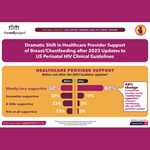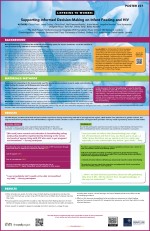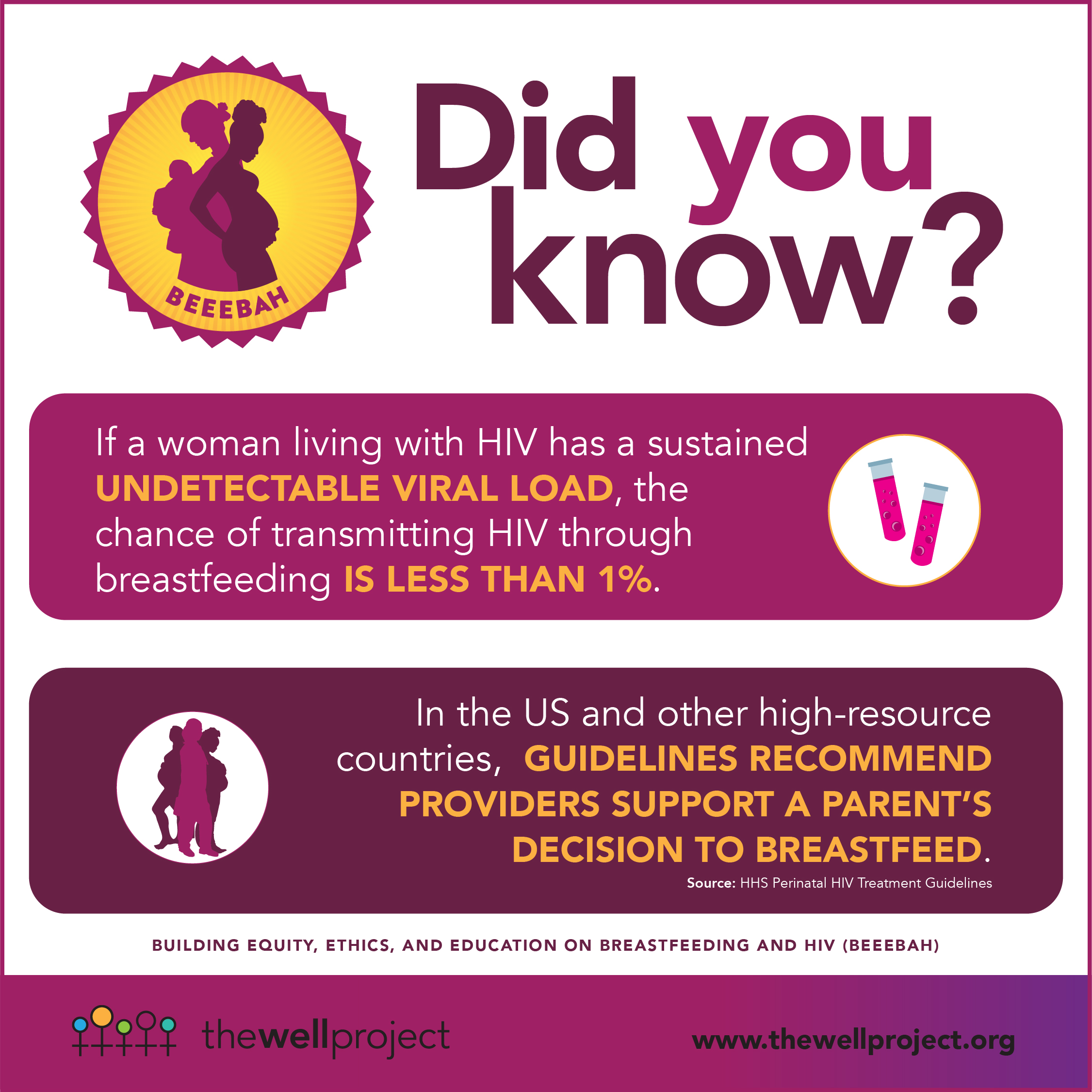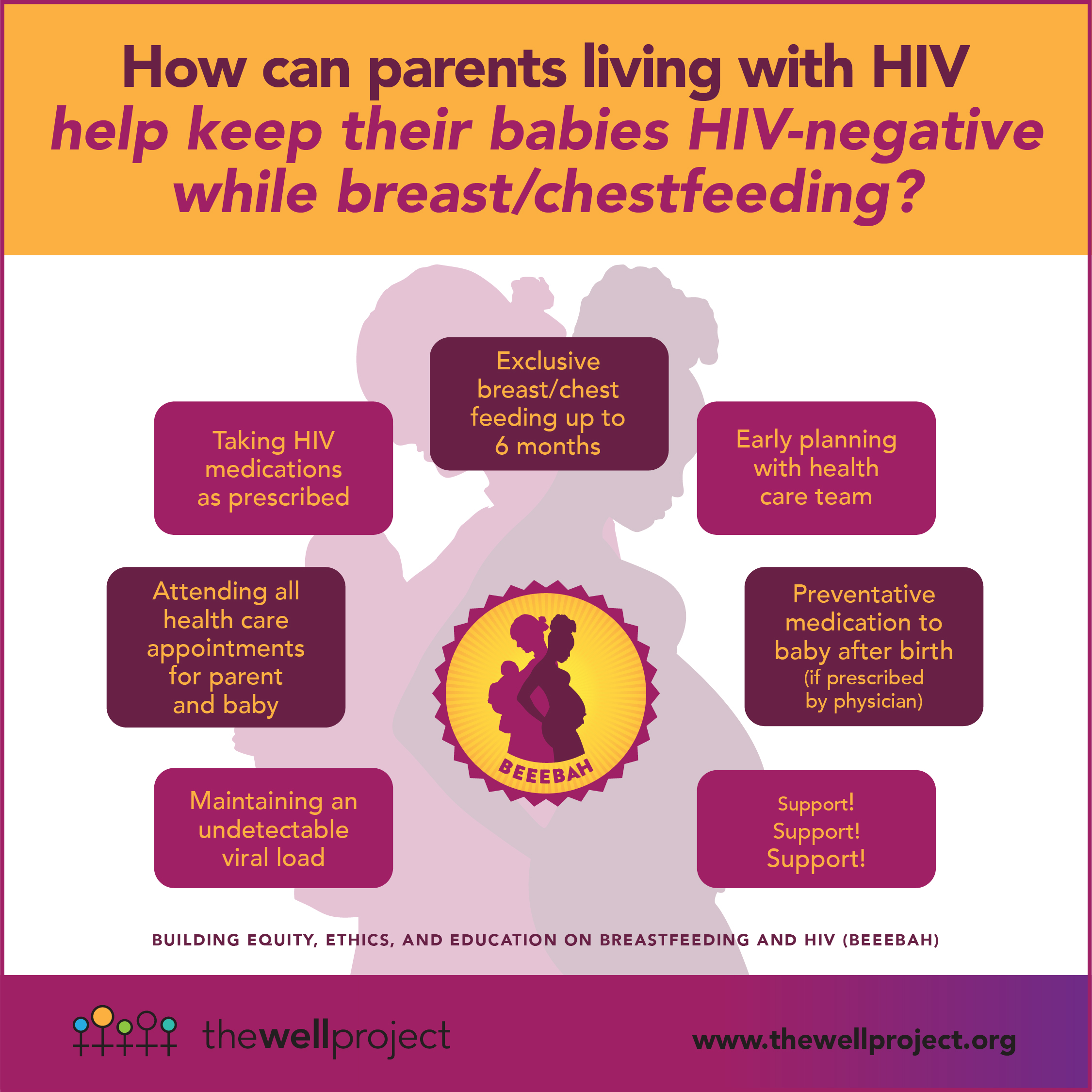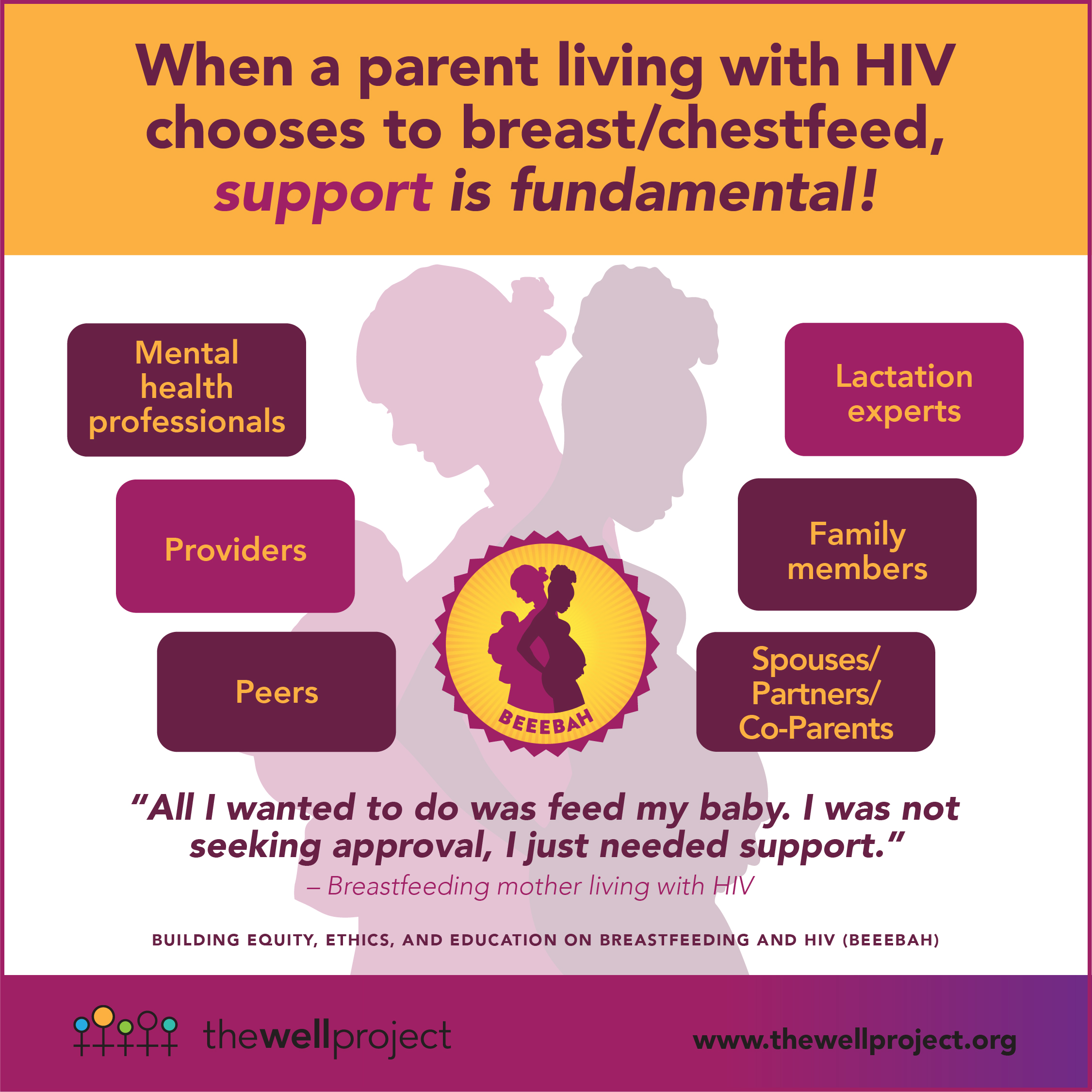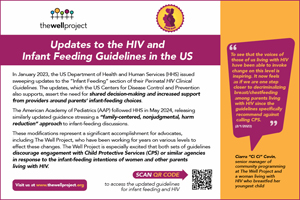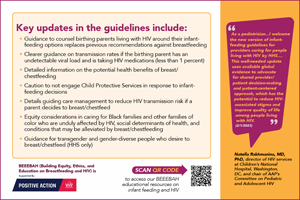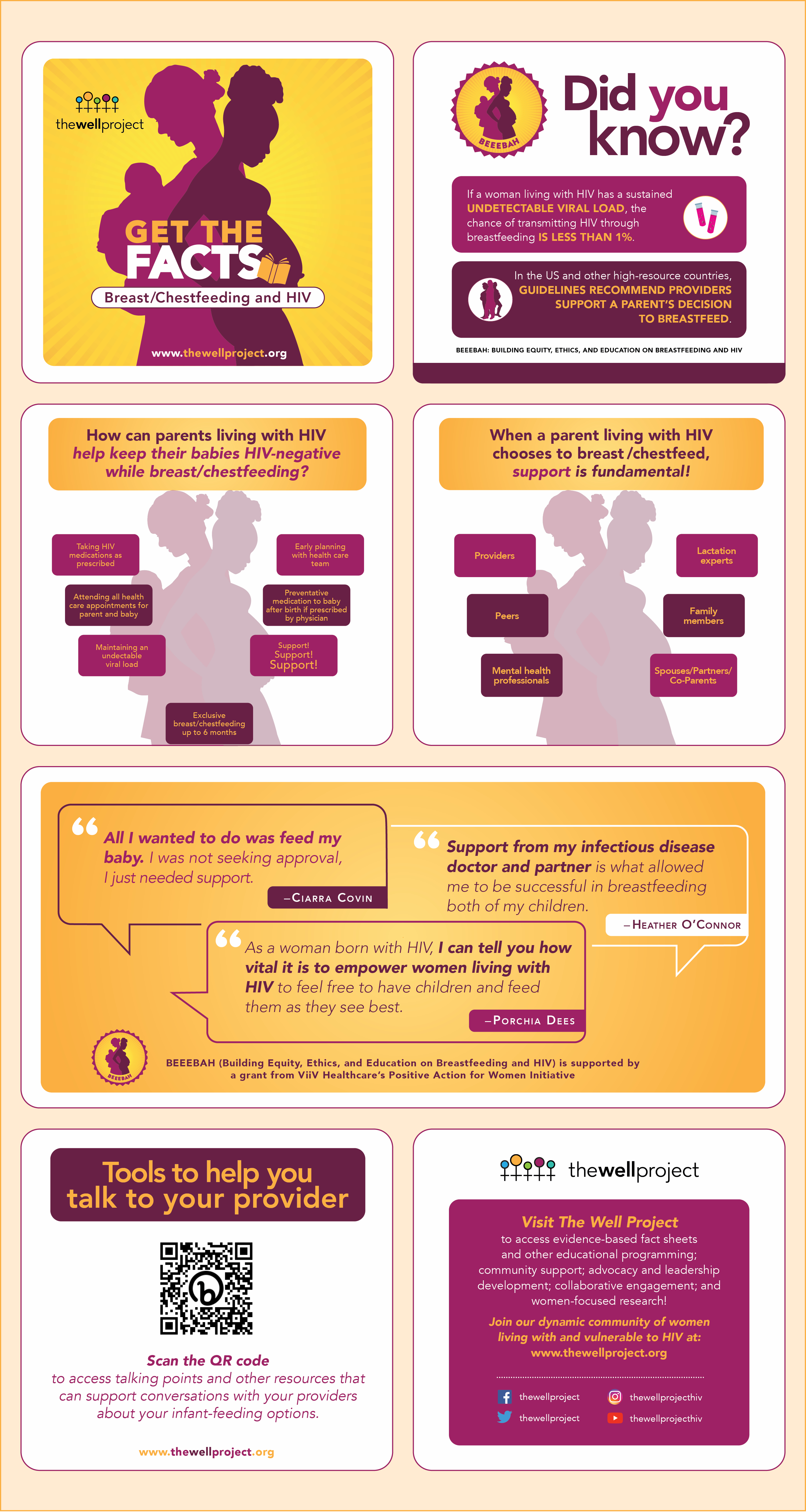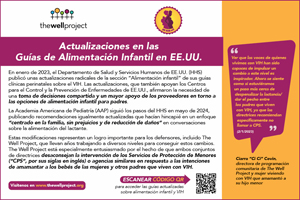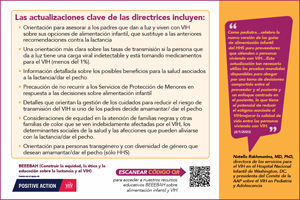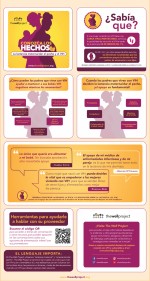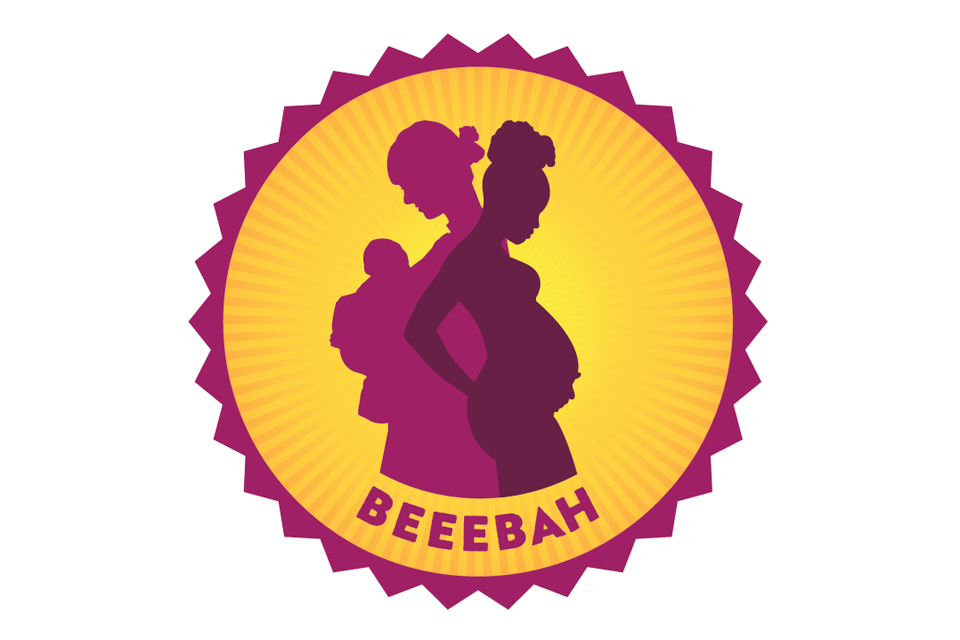
What's on This Page?
- About BEEEBAH
- Read: News and Perspectives
- Watch/Listen: Expert Conversations
- Support: Discussion Groups
- Connect: Provider Resources
- Learn: Infographics and Educational Guides
- Build: Partner Highlights
- Order Materials
- La lactancia y el VIH: En español
About BEEEBAH
Welcome to BEEEBAH (Building Equity, Ethics, and Education on Breastfeeding and HIV)! This comprehensive, multi-tiered project expands upon The Well Project’s efforts to increase knowledge and expand access to information around breast/chestfeeding* and HIV. Through educational resource creation, leadership development, and collaborative efforts, BEEEBAH strives to ensure that women living with HIV can experience their fundamental right to make informed, supported, uncoerced infant-feeding decisions.
BEEEBAH addresses a number of key programmatic goals identified in 2020's Expert Consensus Statement on Breastfeeding* and HIV in the United States and Canada. Launched in December 2021, the program is part of our endeavors to address the lack of women-specific information and representation across all areas of HIV prevention, care, research, and policy.
View a compilation of all The Well Project's work on breast/chestfeeding and HIV since 2018
We add new content to this page regularly as programs are rolled out – so please check back often for new educational and multi-media programs that we hope you will share widely! If you are interested in joining the HIV and Infant feeding listserv for updates, please email The Well Project's editorial director Olivia Ford.
News and Perspectives
I Have Questions and Answers: A Recap from the International Workshop on Women & HIV 2025
"It's important that this type of representation is recognized, appreciated, and honored. And even more than that, it must be the standard. We all bring value to this work and to the people that we serve on a day-to-day basis. They need us."
Patient Perspective by Ciarra Covin Published in the Journal HIV Research and Clinical Practice
Read a journal article by The Well Project's Ciarra "Ci Ci" Covin titled "Parenting with HIV: a Patient's View on Updated Infant Feeding Guidelines in the US," about the experience of and updated guidance around breast/chestfeeding.
The Well Project Welcomes Pediatric Guideline Updates on Infant Feeding and HIV in the US
Updated infant feeding guidance from the premier US pediatric provider group stresses a "family-centered, nonjudgmental" approach to support parents living with HIV who want to breast/chestfeed and are taking effective HIV treatment.
The Well Project at the 2023 Motown Experience: Birth & Breastfeeding Conference
"This conference was like a breath of fresh air and very much needed. It gave me confidence to accept my role as an advocate for Black maternal and infant health, bridged a gap to Black birthing and breastfeeding community that I had previously counted myself out of, and sparked lightbulbs of researchers and providers as they return to their work."
Infant Feeding: How Updated Guidelines Help Parents Living with HIV (Positively Aware)
Support for parents living with HIV in the US has improved with updated federal guidance affirming informed, shared infant-feeding decision-making. The Well Project's Olivia G. Ford writes for Positively Aware about five key entry points to the new HIV and infant feeding guidelines.
The Well Project Applauds Updates to Perinatal HIV Clinical Guidelines around Breast/Chestfeeding for Women and Other Birthing Parents Living with HIV
As a result of years of advocacy by women living with HIV, providers, and others – including The Well Project – updates to the US Perinatal HIV Clinical Guidelines on January 31, 2023, assert the need for increased support from providers for parents' infant-feeding choices. The guideline updates state the likelihood of transmission if the birthing parent has an undetectable viral load and is taking HIV drugs (less than 1 percent); provide more detailed information on the potential benefits of breast/chestfeeding; and offer guidance for providers counseling birthing parents around their infant-feeding options.
Expert Conversations
Reproductive Life with HIV: Action Steps from Pregnancy Planning to Infant Feeding – WATCH! 2.0
You may already be aware of the fact that people living with HIV can have safe, healthy pregnancies and thriving babies who remain HIV-negative. In the fifth session of the WATCH! 2.0 series, we dig deeper into how we got to this point, what conception, pregnancy, birth, and the postpartum period can look like for parents living with HIV, and how advocacy for yourself and others can play a role.
Podcasts
Ciarra "Ci Ci" Covin on HIV Stigma: People Living with HIV Are Still Human, with the Same Desires
In this episode of Everybody Hates Me: Let's Talk About Stigma, Ci Ci talks with host Dr. Carmen Logie about the persistence of HIV stigma in society and how it affects self-stigma and self-acceptance, advances with U=U, breastfeeding and HIV, and much more.
It's Time to Embrace Breastfeeding/Chestfeeding for US People With HIV
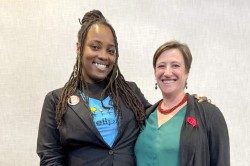
On this episode of The Future of HIV Care, a monthly podcast from TheBodyPro, physician Lealah Pollock, MD, and advocate Ciarra "Ci Ci" Covin explain how recent changes to US perinatal HIV guidelines reveal an important shift in how we fundamentally approach the clinician-patient relationship with pregnant and infant-feeding people who are living with HIV.
Leadership Exchange LIVE: BEEEBAH Edition
Leadership Exchange LIVE: BEEEBAH Edition features live, interactive conversations between thoughtleaders on infant feeding and HIV exploring one another's work, activism, and personal experiences.
Updates to the Perinatal HIV Clinical Guidelines!
The fourth session featured Ciarra "Ci Ci" Covin (The Well Project) and Lealah Pollock, MD, MS (University of California, San Francisco). Watch this powerful discussion of recent updates to the Perinatal HIV Clinical Guidelines asserting the need for shared decision-making between providers and parents living with HIV and increased support from providers for parents' infant-feeding choices. This is big news!
Breastfeeding, HIV, and Criminalization: Legal Considerations from a US Attorney
The third session of our Leadership Exchange LIVE: BEEEBAH edition features Ciarra "Ci Ci" Covin (The Well Project) and Catherine Hanssens (The Center for HIV Law and Policy). Ci Ci relates her personal experiences as a woman living with HIV, new parent, and advocate; Catherine shares insights from her work as an attorney who has been active in HIV legal and policy issues since 1984.
The Big Picture: Health Implications and Bioethical Considerations of Breastfeeding and HIV
For our second session of Leadership Exchange LIVE: BEEEBAH Edition, The Well Project's Ciarra "Ci Ci" Covin was joined by Marielle Gross, MD, MBE, an OB/GYN and bioethicist at the University of Pittsburgh and Johns Hopkins. Ci Ci and Marielle have shared a stage to talk about breast/chestfeeding and HIV before; the two reconnected to discuss race, maternal health, and ethics around infant feeding and HIV - including supporting parents living with HIV to engage in shared, informed infant feeding decision-making.
Breastfeeding and HIV: Viewpoints from an Adult and Pediatric Provider
In the inaugural session of Leadership Exchange LIVE: BEEEBAH Edition, The Well Project's Ciarra "Ci Ci" Covin sat down with pediatric and adult infectious disease physician Allison Agwu, MD, ScM, of Johns Hopkins. Covin related her personal experiences as a woman living with HIV, new parent, and advocate; Agwu shared insights from her work caring for women living with HIV across the lifespan (from pediatrics to adults), including women who choose to breastfeed.
Discussion Groups
BEEEBAH Resource Group- a Home For Breast/Chestfeeding Parents Living with HIV
If you are a mother/birthing parent living with HIV or an ally to the movement and would like to learn more about breast/chestfeeding while living with HIV by joining the private BEEEBAH Resource Group on Facebook, please email BEEEBAH@thewellproject.org for an invite. You don't have to do this alone.
HIV and Infant Feeding Listserv
We invite group members to post resources, updates, and information related to HIV and infant feeding, including breast/chestfeeding. To join, please email The Well Project's editorial director Olivia Ford.
Provider Resources
Updated Infant Feeding Recommendations for US Parents Living with HIV: Empowering Patient/Provider Partnership & Communication (PDF)
While strides have been made in disseminating impactful 2023 updates to the infant-feeding guidance in the US Perinatal HIV Clinical Guidelines, gaps in awareness of these changes remain. Co-authors Ciarra Covin and Olivia G. Ford presented a poster on The Well Project's findings to this effect at the 2024 National Ryan White Conference on HIV Care & Treatment in Washington, DC, in August 2024.
Read Ciarra Covin's first-person account of presenting at the conference
The Well Project Survey Reveals Dramatic Shift in Provider Support of Breast/Chestfeeding After 2023 HIV Guideline Updates
Groundbreaking updates to US HIV and infant feeding guidance have led healthcare providers to report favorable changes in support for women and other birthing parents living with HIV who are interested in breast/chestfeeding, according to a survey conducted by The Well Project. Read the report and download shareable infographics highlighting these exciting findings.
Understanding Breast Milk Through an HIV Lens: A Recap from CROI 2024
Breast milk is well known to be the best food for most babies – and there is much to learn about this magical substance in the context of HIV. The Well Project's Olivia G. Ford summarizes posters on the topic from CROI 2024.
Listening to Women: Supporting Informed Decision-Making on Infant Feeding and HIV
The Well Project program manager Ciarra Covin was presenting author for this poster at the International Workshop on HIV & Women 2023 in Seattle, Washington, February 17-18, 2023. This collaborative poster presented data from The Well Project’s 2021 survey of US women living with HIV responding to questions about infant feeding, alongside qualitative results from Nourish-UK’s similarly sized sample of women living with HIV in the UK who were interviewed about how they chose to feed their babies.
Infographics and Educational Guides
Resources to Talk to Your Provider about Breastfeeding and HIV (Disponible en español)
Find out more about breast/chestfeeding and HIV, ways to discuss this option with healthcare providers, and stories from women living with HIV who have breastfed their babies.
Did You Know? Infographics
Click the images below to save and share as jpeg images
Partner Highlights
Projects with Our Partners
The HIV and Infant Feeding Guidelines at Six Months: Perspectives from National Leaders
For the second year in a row, The Well Project and the National Clinician Consultation Center co-hosted the Annual Perinatal HIV Roundtable. Esteemed panelists, in conversation with one another, discussed how their organizations plan to adjust to, address, and implement the new HIV and infant feeding guidance.
Perinatal HIV Roundtable 2022 - Updates in Breast/Chestfeeding: Parent Perspectives and Evolving Practice
Copresented by The Well Project and the National Perinatal HIV Hotline, this annual roundtable geared for providers welcomed anyone with an interest in the topic to the 2022 event. The panel discussion featured medical and legal professionals engaged with supporting parents living with HIV in their infant-feeding journeys, in paired conversation with Black women advocates living with HIV who have navigated those journeys.
Breast/Chestfeeding and HIV in the US: A Listening Session with National Advocates
This webinar brought together women leaders from US-based organizations to provide updates about community-driven efforts underway to expand knowledge around breast/chestfeeding with HIV, promote provider support for parents living with HIV, change policies to reflect current evidence – and how others can get involved. Featured speakers included:
- Cynthia Gutierrez, HIVE
- Martha Cameron, International Community of Women Living with HIV - North America (ICW-NA)
- Davina Conner, Prevention Access Campaign
- D'Andra Willis, The Afiya Center
- Catherine Hanssens, The Center for HIV Law & Policy
- Jenna Conley, Ci Ci Covin, Olivia Ford, and Krista Martel, The Well Project
- Aryah Lester, Transgender Strategy Center
View the chat that took place during the session
Partner Organizations
Maintaining connections with mission-aligned organizations is a key aspect of The Well Project's work. Learn more about groups with which we have engaged as partners whose work shares values and goals with the BEEEBAH program.
4M Network of Mentor Mothers CIC
4M Network of Mentor Mothers CIC (4M) is a unique peer-led program led by Black migrant women. We train women living with HIV across the UK as Mentor Mothers to provide psycho-social support to peers in their pregnancy journey and beyond.
HIVE
HIVE has been at the forefront of innovating comprehensive HIV-informed sexual and reproductive health care since 1989. HIVE provides clinical care, training, advocacy and a virtual hub for disseminating best practices.
International Community of Women Living with HIV (ICW) North America
ICW North America (ICW-NA) exists to lead efforts to secure and improve the quality of life for women living with HIV in Canada and the United States. We do this by mobilizing, organizing, advocating, mentoring and raising consciousness on the issues and policies that directly impact our lives.
Melinated Moms
Melinated Moms is a MOM Profit™ – a community-centered women empowerment social enterprise supporting moms and women to become better versions of themselves through advocacy, education, awareness and entrepreneurship.
Prevention Access Campaign
Prevention Access Campaign's U=U is a growing global community of people living with HIV, allies, researchers, and organizations committed to science-based messaging about people living with HIV and HIV prevention.
SisterSong
SisterSong is a Southern based, national membership organization; our purpose is to build an effective network of individuals and organizations to improve institutional policies and systems that impact the reproductive lives of marginalized communities.
The Afiya Center
The Afiya Center was established in response to the increasing disparities between HIV incidences worldwide and the extraordinary prevalence of HIV among Black women and girls in Texas.
The Center for HIV Law and Policy
The Center for HIV Law and Policy challenges barriers to the rights and health of people affected by HIV, Hepatitis and stigmatized identity through legal advocacy, high-impact policy initiatives, and creation of cross-issue partnerships, networks, and resources.
Transgender Strategy Center
Transgender Strategy Center (TSC) is a trans-led organization powered by a network of trans trainers, coaches and consultants. We provide training and technical assistance to grassroots, trans-led organizations; offer a leadership academy linking individual trans leaders; and collaborate on new ideas and advocacy campaigns.
Order Materials
Updates to the HIV and Infant Feeding Guidelines in the US
The January 2023 updates to the US Department of Health and Human Services’ HIV and infant feeding guidelines assert the need for shared decision-making and increased support from providers around parents' infant-feeding choices. The American Academy of Pediatrics followed in May 2024, releasing similarly updated guidance. Share, download, or print this two-sided postcard highlighting key updates in both sets of guidelines.
Click the images above to save as jpegs or share online; or download a printable pdf of this resource
"Get the Facts on Breast/Chestfeeding and HIV" Pamphlet
Get key facts about breast/chestfeeding and HIV at your fingertips! From snapshots of the latest research and current guidelines to a direct link for support in talking with providers about infant feeding, this pocket-sized folding pamphlet packs vital information into an attractive, readable format. The pamphlet is a helpful resource to share at conferences and community events, in clinic waiting rooms – anywhere women and other potential parents living with HIV are served. (Disponible en español)
Click the image above to save as a jpeg or share online; or download a printable pdf of this resource
Fill out this form to have free copies of this pamphlet and other educational materials shipped to your organization or practice!
En español
Actualizaciones de las guías sobre el VIH y la alimentación infantil en EE.UU.
Las actualizaciones de enero de 2023 de las guías sobre el VIH y la alimentación infantil del Departamento de Salud y Servicios Humanos de EE.UU. afirman la necesidad de una toma de decisiones compartida y de un mayor apoyo por parte de los proveedores en torno a las opciones de alimentación infantil de padres. La Academia Estadounidense de Pediatría le siguió en mayo de 2024, publicando unas directrices actualizadas similares. Comparta, descargue o imprima esta postal de doble cara en la que se hace hincapié en las actualizaciones clave de ambos conjuntos de directrices.
Haga clic en las imágenes de arriba para guardarlas como jpeg o compartirlas en línea; o descargue un pdf imprimible de este recurso
Recursos para hablar sobre la lactancia y el VIH con su proveedor de atención de la salud
Obtenga más información sobre la lactancia y el VIH, preguntas que puede utilizar para iniciar esta discusión con los proveedores medicos, y historias de mujeres que viven con VIH que han amamantado a sus bebés.
Folleto "Conozca los hecho sobre la lactancia materna/dar el pecho y el VIH"
Tenga al alcance de la mano los datos clave sobre la lactancia/dar el pecho y el VIH. Desde resúmenes de las últimas investigaciones y guías actuales hasta un enlace directo de apoyo para hablar con sus proveedores sobre la alimentación infantil, este folleto de tamaño bolsillo reúne información vital en un formato atractivo y legible. El folleto es un recurso útil para compartir en conferencias y eventos comunitarios, en las salas de espera de las clínicas y en cualquier lugar en el que se atienda a mujeres y otros posibles padres viviendo con VIH.
Haga clic en la imagen de la izquierda para guardarla como jpeg o compartirla en línea; o descargue un pdf imprimible de este recurso
Llene este formulario para obtener copias gratuitas de este folleto y otros materiales educativos enviadas a su organización o consultorio
*The language we use around this work includes both "breastfeeding" and "breast/chestfeeding." While our organization focuses on cis and trans women living with HIV, we strive to include trans men, nonbinary individuals, and others living with HIV who wish to explore feeding a child from their body. We acknowledge that there are multiple terms to describe this process.
BEEEBAH has received initial grant funding from ViiV Healthcare's Positive Action for Women initiative.


